- This off the beaten track seven day yatra in MP and UP also
includes visit to Kalinjar Fort, Pandav and Raneh Waterfalls. It is a lovely
day-wise photo feature.
Day 1 Train Journey
The Dadar Balia train number 01025 left Mumbai at 2 pm. Alternate train – Rajdhani Express leaves Mumbai about 4.30 pm, reaches Jhansi around 5.30 am from where you drive to Khajuraho in about 2 hours.
We visited in
September-October 2024, just after the rains.
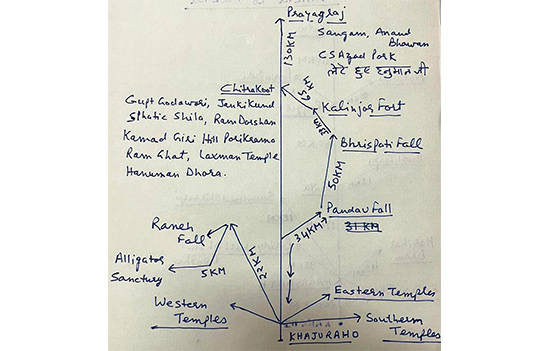 Our route map, always write by hand before start of yatra.
Our route map, always write by hand before start of yatra.
Day 2 Train journey and Khajuraho Temples
Next day we
reached Khajuraho at 1 pm. Here we hired a taxi for two days for Rs 3000/. The
taxi took us to Hotel Jhankar of MP Tourism. Khajuraho has three groups of temples namely Western, Eastern and Southern
Groups.
All these temples were built
by Chandel Dynasty which ruled Bundelkhand from the 9th to 13th
centuries.
We started
with two temples of southern group, Chaturbhuj and Dulhadev.
Story goes that a bridegroom died en-route while returning with his bride after wedding. The newly married girl sat at the site of her husband’s death with his dead body. She prayed & prayed to give life to her husband. God relented and the boy opened his eyes. At this site Dulhadev Temple is built.
Eastern group
has Jain and a few other temples. The highlight of this group is Temple of
Vaman Avtar of Lord Vishnu.
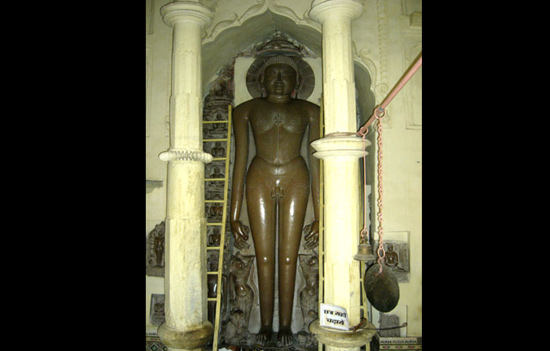 14 feet murti of Lord Parshavanath at Shri Shantinath temple, Khajuraho.
14 feet murti of Lord Parshavanath at Shri Shantinath temple, Khajuraho.
The story goes that King Bali started a Yagna and called thousands of people to give them what they asked for. People started coming from far off places and were suitably rewarded. Demon King Bal’s reputation spread and this made him think that he could dethrone Lord Indra from his seat. King Indra requested Lord Vishnu to intervene.
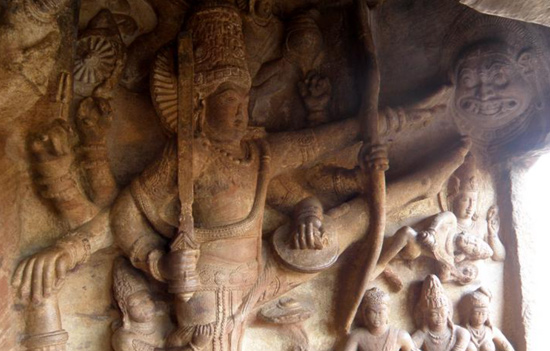 Vaman avatar depicted at Badami Caves, Karnataka for a visual representation of the story below.
Vaman avatar depicted at Badami Caves, Karnataka for a visual representation of the story below.
Lord Vishnu came
to King Bali in the incarnation of a dwarf (Vaman) and asked for land measuring
his three steps. When King Bali agreed
to the request, Lord Vishnu in Vaman Avtar, claimed all the land in two steps
and asked King Bali to where he should put the third step. King Bali understood that the Vaman is Lord
Vishnu only, he requested him to put the third step on his head. Thus, Lord Vishnu made King Bali realize the
futility of his arrogance.
Last temple of
the day was Matangeshwar Temple. This is dedicated to Bhagwan Shiv and has a
Shivling of 18 feet i.e. 9 feet, each above and below the temple platform (platform
is called Jagati).
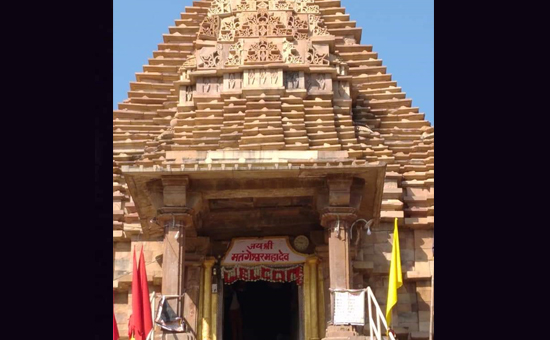 Entrance to Matangeshwar Temple.
Entrance to Matangeshwar Temple.
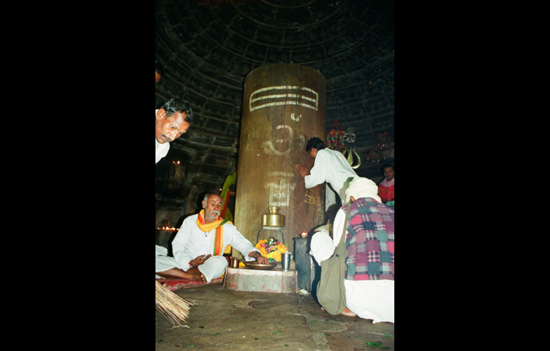 Linga.
Linga.
Day 3 Close to Khajuraho - Raneh Waterfall,
Alligator Sanctuary
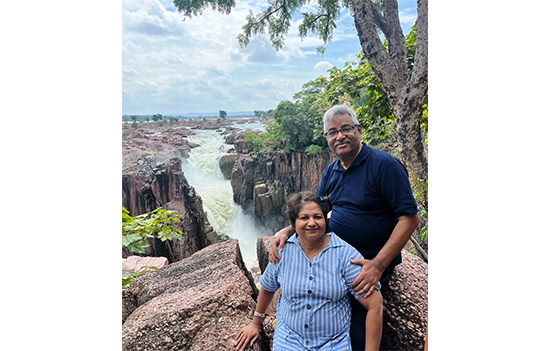 Raneh
waterfall.
Raneh
waterfall.
At around 8.30 am we started for Raneh
Waterfall on Ken River which is 34 km from the city. Ken River
originates from village Ahirgawan in Katni district of Madhya Pradesh. After
travelling 427 km it merges into river Yamuna in Banda district of Uttar Pradesh.
This river is known as cleanest river of India.
The force, noise and number of water streams were
mesmerising. We were told that thousands of years ago a volcano had erupted at
this site which resulted in five earth colours representing five minerals. They
are pink for Granite, red for Jasper, black for Basalt, light pink for Quartz
and yellow for Dolomite.
Five kms from Raneh Fall is a Government Alligator Sanctuary on the banks of Ken
River. One can see hundreds of baby
alligators at this place.
We returned to Khajuraho to visit the most spectacular
temple group i.e. Western Group of temples.
In this temple complex, there are 12 temples-5 big and 7 small. This temple complex is a UNESCO Heritage Site,
one of three such sites in MP.
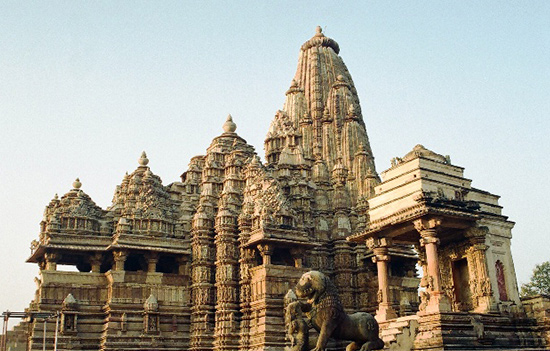 Left Kandariya Mahadev, right is Jagdamba Temple.
Left Kandariya Mahadev, right is Jagdamba Temple.
Khajuraho is known for its erotic sculptures i.e. men and
women carved in sexual positions. But it
needs to be said that such erotic sculptures are less than 5% of total
sculptures in the Western Group. The
guide explained us that during that period, people were renouncing the material
world and opting for the life of a hermit.
To stop this phenomena, the Chandel Kings ordered for sculpting the erotic
carvings.
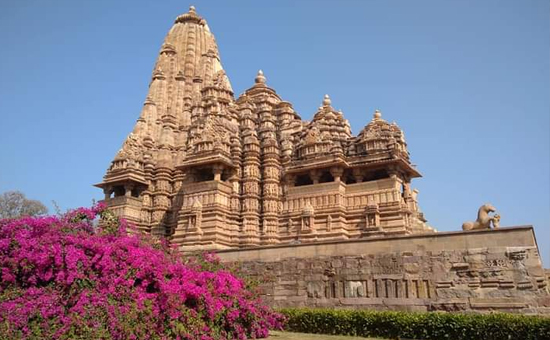 Best among the big 5 is Kanderia Mahadev Temple, it looks like a small hillock when seen from the ground.
Best among the big 5 is Kanderia Mahadev Temple, it looks like a small hillock when seen from the ground.
Day 4 Pandav Falls, Bhrispati Kund, Kalinjar Fort, Chitrakoot
In the morning we started for Pandav Fall which is 34 km
away from Khajuraho. During their Agyat
Vaas Pandav Brothers along with Mata Kunti and Draupadi, stayed at this
site for a few days. There is a very
beautiful water fall and a pond. To see 12.60 minute video on cave and waterfall
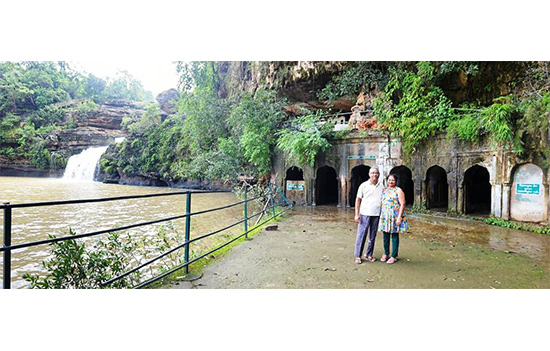 Pandav Waterfall, on right is Pandava Caves.
Pandav Waterfall, on right is Pandava Caves.
The guides of Forest Department explained many things,
unknown to us. He said that two kinds of
water flow, rain and ground water. The
former does not flow throughout the year while the latter flows during the
year. He showed us the pugmarks of bear
on trees, which climbs the trees to gorge on honey from honeycombs.
Freedon fighter Chandra Shekhar Azad had visited this
place on 04-09-1929 to mobilize the local youths to participate in the freedom movement. His statute is installed at this place.
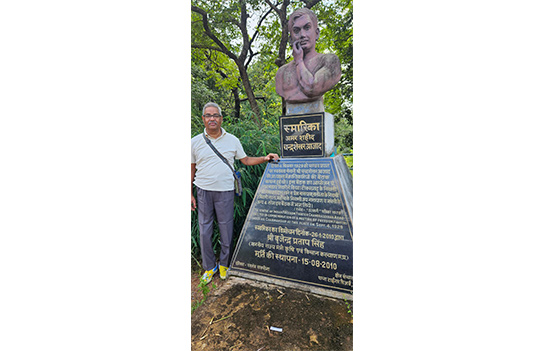 Azad statue.
Azad statue.
Our next stop was, Bhrispati Kund, 50 km away from the Pandav Fall. At this site water from a small river falls
in to a 200-meter-deep gorge and creates a huge rainbow.
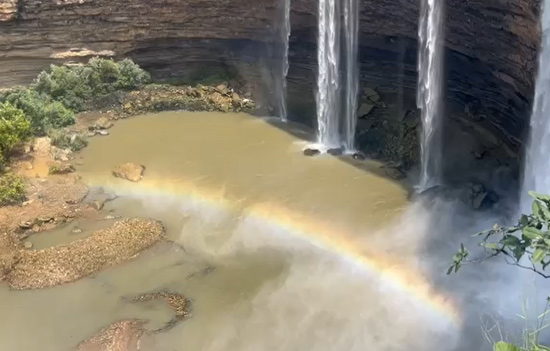 Rainbow, loved this place.
Rainbow, loved this place.
Third stop of the day was a 5th century Kalinjar Fort in Banda District of Uttar
Pradesh. This fort is built on a 1200
feet high hillock and was ruled by various dynasties before it fell to the
British in the year 1812.
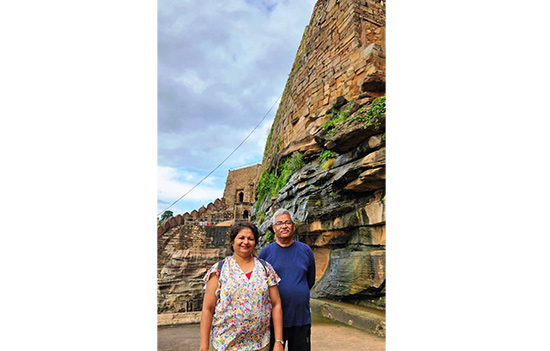 Fort entrance.
Fort entrance.
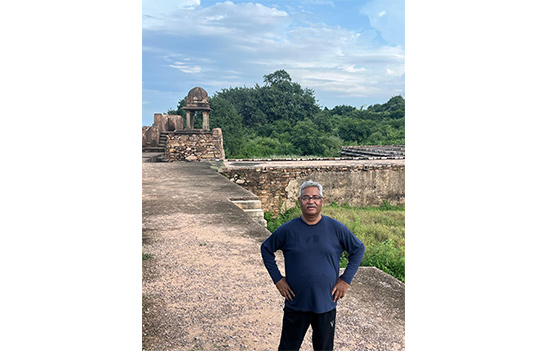 Boundary wall.
Boundary wall.
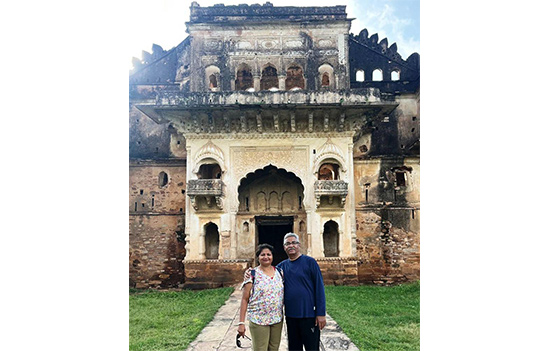 Background Rani Mahal
Background Rani Mahal
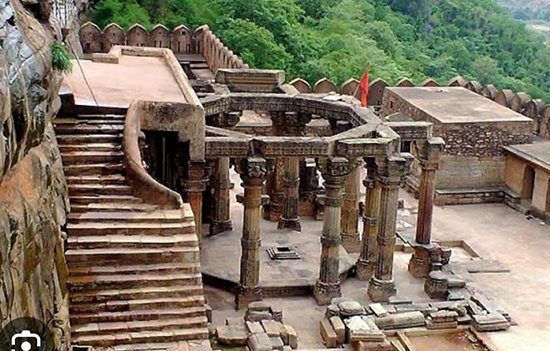 Top view of Neelkanth Mahadev Mandir
Top view of Neelkanth Mahadev Mandir
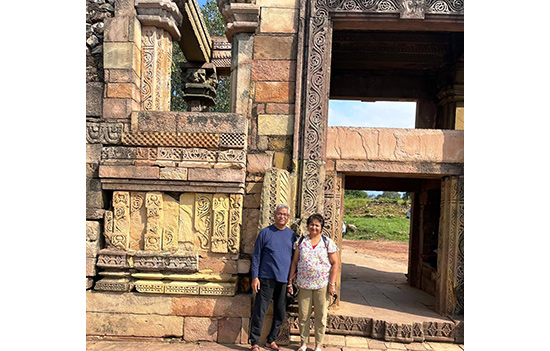 Entrance to temple.
Entrance to temple.
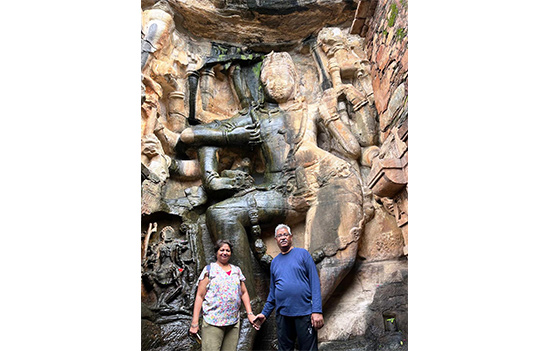 7.1 metre high murti of Kal Bhairav, carved on a mountain side at fort.
7.1 metre high murti of Kal Bhairav, carved on a mountain side at fort.
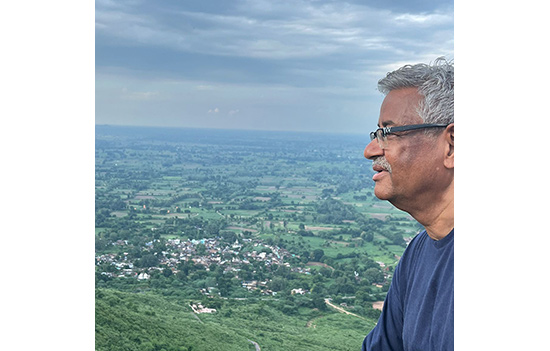 View from fort.
View from fort.
The fort has many murtis of various gods and goddesses,
highlighted by a 7.1-meter-high statute of Kaal Bhairav and a temple of
Lord Shiva, named Neel Kanth Mahadev.
The story goes that, when Lord Shiva consumed poison and his throat
became blue, he came to this fort to defeat Kaal. There are many old palaces and ponds on the
plateau. View of the plains from the top of fort is heavenly.
We reached Chitrakoot in the evening by driving app 65
km. Chitrakoot is where Sri Ram spent 11
years, 6 months and 21 days out of his 14 year Vanvass. We visited Ram Ghat on river Mandakini and
enjoyed the Evening Aarti on the bank of the river sitting in a boat.
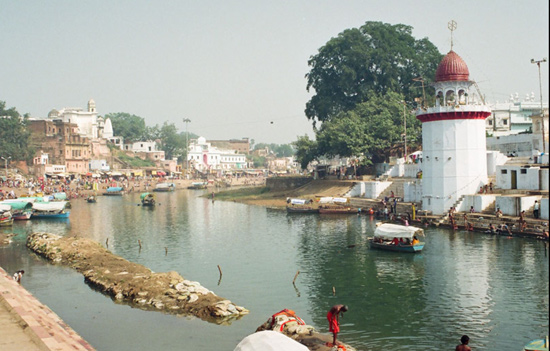 Ram Ghat on the river Mandakini.
Ram Ghat on the river Mandakini.
Day 5 Chitrakoot
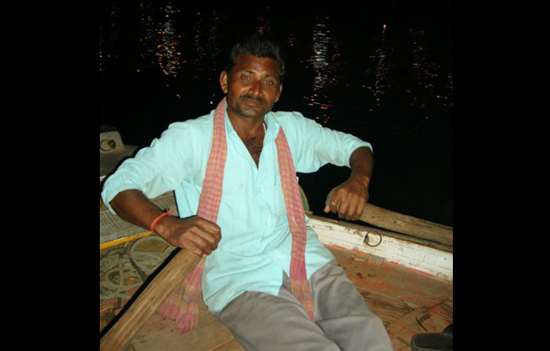 Our boatman knew the Ramayana by heart, recited while he rowed.
Our boatman knew the Ramayana by heart, recited while he rowed.
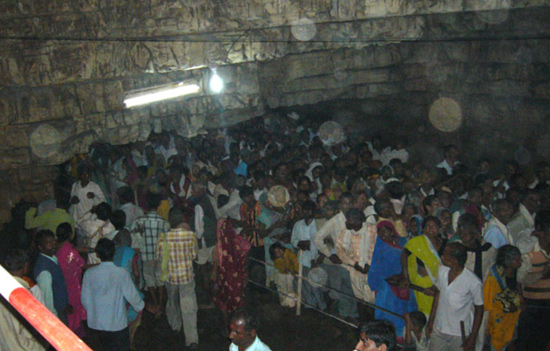 Inside Gupt Godavari Cave.
Inside Gupt Godavari Cave.
There are many places associated with Sri Ram, Sita and
Laxman. The caves of Gupt Godavwari, Laxman
Hill, Hanuman Dhara, Ganesh Bag are places to visit. There is a tradition to walk around the hill
of Kamadgiri, a Parikrma of 5 km.
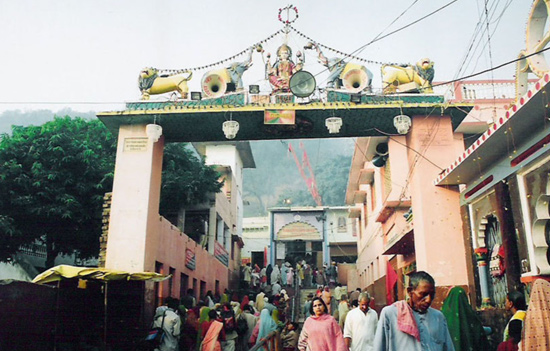 Starting point of Kamadgiri Parikrama.
Starting point of Kamadgiri Parikrama.
As per tradition, Laxman Ji used to sit at the top of Kadamgiri Hill to watch for any enemy, the temple at top has Laxman ji’s statute in his watchman’s posture. Ropeway is available for climbing up to this hill.
Hamuman Dhara has a murti of Lord Hanuman and natural
water flows from his left hand, so the name Hamuman Dhara. Here the local Pande/Poojari are big menace,
keep on nagging for donations. Ropeway
is available to climb up this hill also.
Ram Darshan Gallery beautifully depicts the life of
Sri Ram and is worth visiting. Ganesh Bag, also known as
mini Khajuraho, is little out of the town and should be visited in day time.
Day 6 Left for Prayagraj – local sight-seeing
When we came out of our hotel early morning we found that
Chitrakoot was full of devotees. On asking we were told that day being Amavasya,
devotees from all over Uttar and Madhya Pradesh come to take a holy dip in
river Mandakini and for a Parikrma of Kadamgiri Hill.
No transport was allowed in the city area, so we had to
walk a distance of 2 km with our bags. Eventually we got an Auto Rikshaw for the
bus stand. We took a UP state transport bus
to Prayagraj, 130 km away.
Our first stop in Prayagraj was Amar
Shaheed Chandra Shekhar Azad Park.
In the British time this park was known as Alfred Park, and it is close
to Anand Bhawan, residence of Nehru Ji. We were told that once Azad was hiding
in this park and Nehru informed the British Police. They came. A gun battle
followed. Azad, as his name suggests, refused to succumb to the British Police
and he put his last bullet in his head to avoid British Jails.
Next, we went to Sangam, place where River Yamuna merges
with the Ganga and Saraswati. This is one of the holiest places for Hindus, who
come here for Pind Dan of their
ancestors. Boats are available for
devotees to go to a place where one can see Ganga and Yamuna merging.
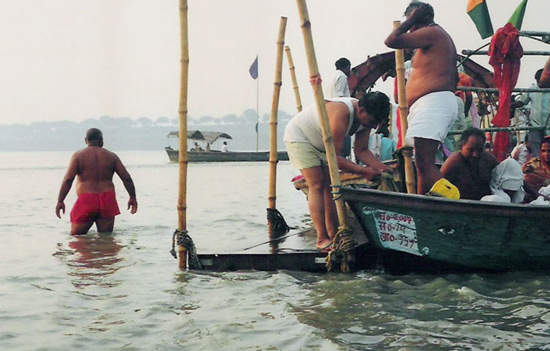 A devotee going for a dip in the Sangam.
A devotee going for a dip in the Sangam.
In the middle of the river we filled a few bottles of
Ganga Water as was requested by some friends.
After a 45-minute boat ride we returned to the bank and
then visited, the famous Lete Hue Hnuman Ji. It is said that when Sri Ram
was returning from Sri Lanka Hanuman Ji felt tired at this place. Mata Sita advised him to take a nap, so a murti
of Hanuman, in sleeping position, is worshipped here.
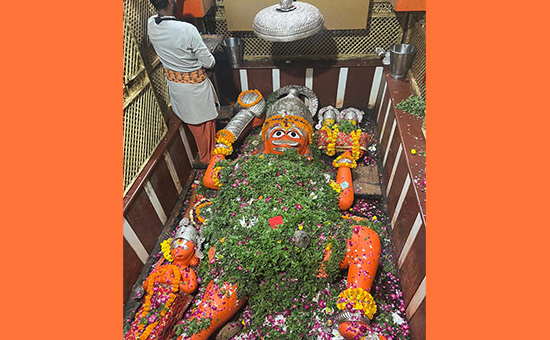
Day 7 Prayagraj local and Fly back to Mumbai
In the morning, we saw two historically famous bungalows,
Anand Bhawan and Swaraj Bhawan, both being adjacent. Anand Bhawan was built by Barrister Moti Lal
Nehru, a renowned man of Prayagraj at that time and Swaraj Bhawan was purchased
by Moti Lal Nehru. Indira Gandhi was
born in Swaraj Bhawan.
In both the bungalows, belongings of Nehru Family e.g. furniture, crockery, cutlery, clothes, shoes, letters, books,
photos, items of personal use are displayed. There is an entry ticket of Rs.
100/- to visit these bungalows.
We also
visited a park named after Sage Bhardwaj. It is said that thousands of years
ago Sage Bharadwaj had his Ashram near Sangam. In those days a teacher having
10,000 disciples was called a Maharshi. He was the first such Maharshi.
This was the last day of our trip. We reached airport at
1 pm and boarded a flight to Mumbai.
We missed seeing Orchha i.e. about two hours drive from
Khajuraho or 15 kms from Jhansi railway station. To see album
Also see albums
1. Khajuraho
Temples Western
2. All about
Khajuraho Temples
3. Meaning
behind erotic sculptures in Khajuraho
4. Khajuraho temples – A Journey from real to surreal
5. Lakshmana
Temple
6. Chitrakoot